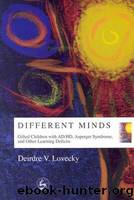Different Minds by Lovecky Deirdre V

Author:Lovecky, Deirdre V. [Lovecky, Deirdre V.]
Language: eng
Format: epub
Tags: Health
ISBN: 9781853029646
Amazon: 1853029645
Barnesnoble: 1853029645
Goodreads: 210358
Publisher: Jessica Kingsley Pub
Published: 2003-11-15T00:00:00+00:00
276
Different Minds
Finally, he would meet daily with an adult who could help him evaluate how his plan was working.
• Obsessive rumination about a feeling can also occur. Jillian would talk continuously about a situation she found upsetting, saying the same words over and over, asking for reassurance, and never being reassured for more than a moment. This obsessive questioning in and of itself helped Jillian handle her anxiety, but it drove everyone else crazy. Attempts to limit how many times Jillian could say the same words or ask the same question were somewhat successful in decreasing her obsessing. Giving Jillian words to say to herself to counter her worries did not work. She was unable to use these even with cueing. Medication to decrease obsessive rumination helped significantly.
• Those gifted children with AS who blurt out, or seem to feel, horrifying thoughts and feelings may not be helped by techniques that foster suppression or changing to less powerful images. It is hard to cue children with AS to follow these directives. A behavioral treatment plan may be helpful for some of these children using tiny steps and tiny goals. Medication may also be helpful in decreasing the intrusive thoughts.
DEALING WITH FRUSTRATION
Children with AS are easily frustrated. They have so many things they want and need to have just so, and real life isn’t like this. It is so frustrating to count on the bus arriving at the same exact time each day, and then have it arrive late or early. It is frustrating to need to eat your breakfast in a certain way, and that day mom decides she needs to have you eat it in the car because the alarm didn’t go off and you are late for school. Unlike the frustration of children with AD/HD, children with AS feel upset when things are different from their very rigid expectations.
This is because these rigid expectations are what helps them make sense of a chaotic world. When the routine changes, they can’t see the central likeness of the situation to what they expect (we will still get to school). Instead, these children feel as if since that piece was destroyed, the whole will be different (you can’t go to school a different way, or late, and so on). Ratey and Johnson (1997) describe this rigidity as if the AS person could not connect how events that lead to the same result come together. Thus, one man they described always came into the house through the front door. It was as if to him coming into the house through the back door was a totally different experience, whereas most people know that either door takes them to the same goal.
Download
This site does not store any files on its server. We only index and link to content provided by other sites. Please contact the content providers to delete copyright contents if any and email us, we'll remove relevant links or contents immediately.
| Behavioral Disorders | Communicative Disorders |
| Gifted Students | Inclusive Education |
| Learning Disabled | Mentally Disabled |
| Physically Disabled |
The Art of Coaching Workbook by Elena Aguilar(48062)
Trainspotting by Irvine Welsh(20054)
Twilight of the Idols With the Antichrist and Ecce Homo by Friedrich Nietzsche(17705)
Fangirl by Rainbow Rowell(7833)
Periodization Training for Sports by Tudor Bompa(7328)
Change Your Questions, Change Your Life by Marilee Adams(6641)
This Is How You Lose Her by Junot Diaz(5769)
Grit by Angela Duckworth(4735)
Red Sparrow by Jason Matthews(4664)
Asking the Right Questions: A Guide to Critical Thinking by M. Neil Browne & Stuart M. Keeley(4574)
Paper Towns by Green John(4169)
Room 212 by Kate Stewart(4105)
Ken Follett - World without end by Ken Follett(3972)
The Sports Rules Book by Human Kinetics(3588)
Housekeeping by Marilynne Robinson(3401)
The Motorcycle Diaries by Ernesto Che Guevara(3332)
Introduction to Kinesiology by Shirl J. Hoffman(3299)
Exercise Technique Manual for Resistance Training by National Strength & Conditioning Association(3291)
Double Down (Diary of a Wimpy Kid Book 11) by Jeff Kinney(3272)
